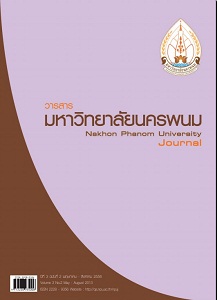ความคาดหวังของประชาชนต่อบทบาทการจัดการศึกษาอบรม : ศึกษากรณีประชาชน ในอำเภอมะขาม จังหวัดจันทบุรี
Main Article Content
Abstract
การวิจัยครั้งนี้มีวัตถุประสงค์เพื่อ 1) ศึกษาความคาดหวังของประชาชนต่อบทบาทการจัดการศึกษาอบรมตามพระราชบัญญัติ กำหนดแผนและขั้นตอนการกระจายอำนาจให้แก่องค์กรปกครองส่วนท้องถิ่น พ.ศ. 2542 มาตรา 16 (11) 2) เปรียบเทียบความคาดหวัง ของประชาชนต่อบทบาทการจัดการศึกษาอบรมตามพระราชบัญญัติกำหนดแผนและขั้นตอนการกระจายอำนาจให้แก่องค์กรปกครอง ส่วนท้องถิ่น พ.ศ. 2542 มาตรา 16 (11) ที่มีระดับการศึกษาและอาชีพ แตกต่างกัน 3) ศึกษาสภาพปัญหา อุปสรรคและข้อเสนอแนะใน การพัฒนาการจัดการศึกษาอบรม ตามพระราชบัญญัติกำหนดแผนและขั้นตอนการกระจายอำนาจให้แก่องค์กรปกครองส่วนท้องถิ่น พ.ศ.2542 มาตรา 16 (11) ประชากรที่ใช้ในการวิจัยครั้งนี้ คือ ประชาชนที่อาศัยอยู่ตามทะเบียนราษฎร์ในเขตอำเภอมะขาม จังหวัด จันทบุรี จำนวน 30,675 คนผู้วิจัยได้กำหนดกลุ่มตัวอย่างโดยใช้สูตรของทาโร ยามาเน่ ที่ระดับความเชื่อมั่นร้อยละ 95 จำนวนกลุ่ม ตัวอย่าง 400 คนใช้วิธีสุ่มตัวอย่างแบบง่ายโดยการจับฉลากเครื่องมือการวิจัยเป็นแบบสอบถามที่มีค่าความเชื่อมั่นทั้งฉบับเท่ากับ 0.83 และแบบสัมภาษณ์การวิเคราะห์ข้อมูลใช้ ร้อยละค่าเฉลี่ยค่าเบี่ยงเบนมาตรฐานเปรียบเทียบความแตกต่างใช้ t-test ผลการวิจัยพบว่า 1) ความคาดหวังของประชาชนต่อบทบาทการจัดการศึกษาอบรมตามพระราชบัญญัติกำหนดแผนและขั้นตอนการกระจายอำนาจให้แก่ องค์กรปกครองส่วนท้องถิ่น พ.ศ. 2542 มาตรา 16 (11) โดยภาพรวมอยู่ในระดับปานกลาง 2) ประชาชนที่มีระดับการศึกษาต่างกัน มีความคาดหวังต่อบทบาทการจัดการศึกษาอบรม ไม่แตกต่างกันและกลุ่มตัวอย่างที่มีอาชีพต่างกันมีความคาดหวังต่อบทบาท การจัดการศึกษาอบรม แตกต่างกันอย่างมีนัยสำคัญทางสถิติที่ระดับ .05 3) ปัญหา อุปสรรค ข้อเสนอแนะต่อการจัดการศึกษาอบรม ประกอบด้วยองค์กรปกครองส่วนท้องถิ่นยังขาดงบประมาณสนับสนุนการจัดการศึกษาอบรมในชุมชน ความไม่พร้อมของบุคลากร องค์กรปกครองส่วนท้องถิ่นยังขาดบุคลากรที่มีความรู้ความชำนาญและที่รับผิดชอบงานด้านการจัดการศึกษาอบรมโดยตรง
The purposes of this study were 1) to in vestigate people’s expectations forthe role of training education management under the Act B.E. 2542, Section 16 (11) of planning determination and process of decentralization of power to local governments, 2) to compare people’s expectations for the role of training education management under the Act B.E. 2542, Section 16 (11) of planning determination and process of decentralization of power to local governments, and 3) to examine the problem states, obstacles and suggestions for the development of training education management under the Act B.E. 2542, Section 16 (11) of planning determination and process of decentralization of power to local governments. The population used in this study was 30,675 as recorded in household registration of Makhamdistrict, Chanthaburi province. The researcher determined a sample size of 400 using the formula of Taro Yamane at the 95% confidence level. A number of the sample was selected using simple random sampling through drawing lots. The tools were a questionnaire whose entire reliability value was 0.83 and an interview guide. Analysis of data was conducted using percentage, mean, standard deviation and t-test for finding a significant difference. The study results showed: 1) that the overall expectation of the people for the role of training education management under the Act B.E. 2542, Section 16 (11) of planning determination and process of decentralization of power to local governments was at the medium level; 2) that the people whose educational attainments were different were not found different in their expectations for the role of training education management. While those whose occupations were different were found significantly different at the .05 level in their expectations for the role of training education management; 3) that concerning the problems, obstacles, and suggestions of training education management by local governments, it was found that the local governments lacked budget to support for training education management in their community and the personnel had no readiness. Also, local governments lacked some personnel who had knowledge, expertise, and responsibility for training education management directly.


